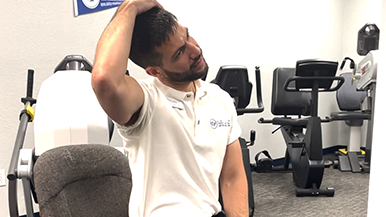
- What is Vestibular Therapy?
- What Types of Problems Benefit from Vestibular Therapy?
- What Is the Process of Vestibular Therapy?
- What Type of Recovery or Outcome Can I Expect from Vestibular Therapy?
Have you ever felt dizzy or experienced vertigo without any apparent reason? You’re not alone. Over 35% of adults aged 40 and older in the United States have experienced vestibular-related issues at some point. What are the reasons behind dizziness or balance problems? And can it be treated or managed? The good news is that there is a solution to this problem; it is called vestibular therapy.
At Ability Rehabilitation, we want to ensure patients stay informed on things they may not completely understand. If you’re wondering about the benefits of vestibular therapy or if it’s suitable for your condition, continue reading on.
What is Vestibular Therapy?
 Vestibular Rehabilitation Therapy (VRT) is a specialized branch of physiotherapy aimed at alleviating symptoms stemming from vestibular disorders. Typically, VRT incorporates manual head maneuvers and a progressive exercise regimen to mitigate vertigo, dizziness, visual impairments, and issues related to balance and falls.
Vestibular Rehabilitation Therapy (VRT) is a specialized branch of physiotherapy aimed at alleviating symptoms stemming from vestibular disorders. Typically, VRT incorporates manual head maneuvers and a progressive exercise regimen to mitigate vertigo, dizziness, visual impairments, and issues related to balance and falls.
Following an injury to the vestibular system, the central nervous system can compensate for diminished inner ear function. This compensation involves the brain adjusting to the imbalanced signals from the vestibular system by relying more heavily on alternative signals from other bodily systems. The central nervous system adapts to maintain vestibular balance through tailored exercise strategies. This process of central compensation alleviates the patient’s symptoms, allowing a return to normal function.
What is the Vestibular System?
Your vestibular system, comprised of inner ear organs, brain centers, and peripheral nerves, detects head movement and position. These inner ear sensors measure rotation, tilt, and directional motions and are connected to the brain via nerves. Your brain processes this information, combining it with input from other senses to trigger appropriate muscle reactions for balance and coordination.
What Types of Problems Benefit From Vestibular Therapy?
- Diagnosed Vestibular Conditions treated with Vestibular Rehabilitation:
- Benign Paroxysmal
- Positional Vertigo (BPPV)
- Vestibular Neuritis/Labyrinthitis
- Unilateral Vestibular
- Hypofunction (UVH)
- Vestibular Migraine
- Persistent Postural
- Perceptual Dizziness (PPPD)
- Mal de Debarquement (MdDS)
- Cervicogenic Dizziness
- Post Concussion Syndrome (PCS)
- Meniere’s Disease
- Neurological conditions (e.g., stroke, traumatic brain injury)
- Vestibular deconditioning from aging or inactivity
- Other vestibular conditions
Symptoms indicating a need for Vestibular Rehabilitation:
- Vertigo (sense of spinning)
- General dizziness or lightheadedness
- Nausea, vomiting, fatigue
- Neck tightness, stiffness, and/or pain
- Imbalance and difficulty walking
- Headaches
- Frequent falls
- Vision issues (e.g., double vision, shaky vision with head movement, difficulty focusing, poor screen tolerance)
- Brain fog, difficulty concentrating, and mild memory issues
What Is the Process of Vestibular Therapy?
Vestibular rehab exercises are easy to learn but require consistent daily practice. We recommend performing them 2-3 times daily, which may be challenging to fit into a busy schedule. Initially, these exercises might temporarily increase symptoms, signifying proper vestibular system stimulation. Over time and with regular practice, symptoms usually decrease and become more manageable. For those diagnosed with Benign Paroxysmal Positional Vertigo (BPPV), specific maneuvers are the primary treatment, but vestibular rehab exercises could also complement manual treatments for BPPV.
What Type of Recovery or Outcome Can I Expect From Vestibular Therapy?
Expected outcomes of vestibular rehabilitation may involve:
- Reduced dizziness symptoms
- Diminished nausea or vomiting
- Enhanced focus, concentration, and memory
- Improved balance while standing or sitting
- Decreased risk of falling
- Enhanced ability to stabilize gaze and focus on near and distant objects
- Improved neck mobility and reduced stiffness or pain
- Reduced fatigue and better sleep quality
- Decreased anxiety and depression, better stress coping
- Increased confidence to resume desired activities and hobbies
Does Vestibular Rehabilitation Therapy Work?
 Absolutely! Evidence supports the use of VRT to ease the symptoms of many different vestibular conditions, including unilateral vestibular hypofunction, chronic dizziness, vestibular migraine, tension-type headaches, PPPD, concussion, and many more.
Absolutely! Evidence supports the use of VRT to ease the symptoms of many different vestibular conditions, including unilateral vestibular hypofunction, chronic dizziness, vestibular migraine, tension-type headaches, PPPD, concussion, and many more.
Understanding vestibular therapy offers hope to those grappling with balance issues and dizziness. Vestibular therapy isn’t just about regaining balance; it’s about reclaiming your life.
At Ability Rehabilitation, our therapists aim to provide personalized care, helping you achieve a better quality of life. Take the first step towards relief—schedule an appointment with one of our therapists today!



